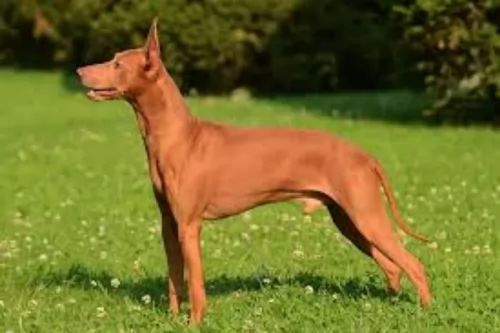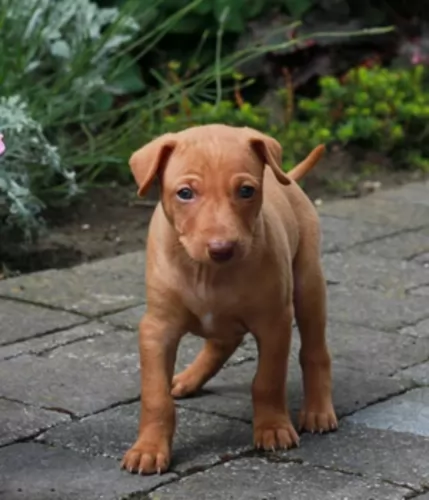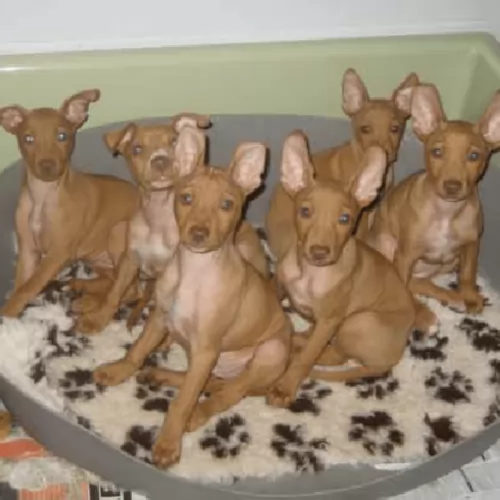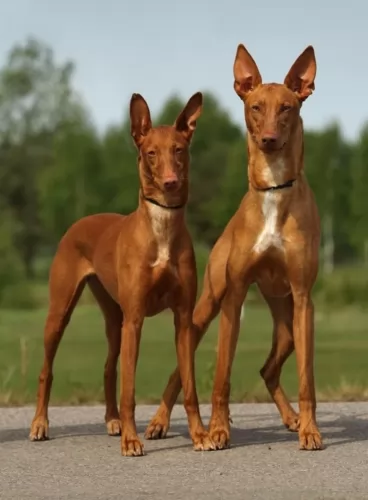 Petzlover
Petzlover Cirneco dell'Etna is originated from Italy but Jug is originated from United Kingdom. Cirneco dell'Etna may grow 16 cm / 7 inches higher than Jug. Both Cirneco dell'Etna and Jug are having almost same weight. Cirneco dell'Etna may live 5 years less than Jug. Cirneco dell'Etna may have more litter size than Jug. Cirneco dell'Etna requires Moderate Maintenance. But Jug requires Low Maintenance
Cirneco dell'Etna is originated from Italy but Jug is originated from United Kingdom. Cirneco dell'Etna may grow 16 cm / 7 inches higher than Jug. Both Cirneco dell'Etna and Jug are having almost same weight. Cirneco dell'Etna may live 5 years less than Jug. Cirneco dell'Etna may have more litter size than Jug. Cirneco dell'Etna requires Moderate Maintenance. But Jug requires Low Maintenance
 The Cirneco dell’Etna comes from the island of Sicily and not mainland Italy, although it is considered an Italian dog. It is a small dog that hunted rabbits and its calling card was its ability to go for hours without water or food. They have terrific endurance and a good sense of smell. They were developed for the harsh terrain they worked around places like Mount Etna. Of all the Mediterranean island hunting dogs, the Cirneco de’Etna is the smallest.
The Cirneco dell’Etna comes from the island of Sicily and not mainland Italy, although it is considered an Italian dog. It is a small dog that hunted rabbits and its calling card was its ability to go for hours without water or food. They have terrific endurance and a good sense of smell. They were developed for the harsh terrain they worked around places like Mount Etna. Of all the Mediterranean island hunting dogs, the Cirneco de’Etna is the smallest.
This is a very ancient breed, surviving on its hunting skills alone for thousands of years on Sicily. They then became guard dogs for the peasants. Because they had such speed, sense of smell, alertness and sight, they were great hunters.
Today’s Cirneco de’Etna is highly competitive in confirmation and make terrific pets. They are exceedingly friendly, energetic and low maintenance. Lure coursing is what they really excel at. They are good at agility and pursuit games as well.
 The Jug is a crossbreed – a mix of a pug and a Jack Russell Terrier and they were bred in England with the idea to keep the basic features of a pug but just with a longer nose.
The Jug is a crossbreed – a mix of a pug and a Jack Russell Terrier and they were bred in England with the idea to keep the basic features of a pug but just with a longer nose.
Details on the origin of the dog are not altogether clear but the dog was developed so that it would reduce the breathing problems that pugs and other flat-faced breeds are known for.
This isn’t an old breed and development started around the 1960s. It is one of the most recent breeds to be registered by the American Canine Hybrid Club.
 The Cirneco de’Etna is a sleek, muscular sighthound. His ears are close together and high on his head. The head is lean, and the skull is almost flat in profile. The muzzle is about the same length as the skull and the nose is large and its coloring matches the dog’s coat. They have hard pads the same color as their nails, but they are never black.
The Cirneco de’Etna is a sleek, muscular sighthound. His ears are close together and high on his head. The head is lean, and the skull is almost flat in profile. The muzzle is about the same length as the skull and the nose is large and its coloring matches the dog’s coat. They have hard pads the same color as their nails, but they are never black.
 The Jug will usually end up having a round head with the typical short muzzle of the Pug. He may be somewhat lighter in build than the Pug, taking more after the Jack Russell in this regard.
The Jug will usually end up having a round head with the typical short muzzle of the Pug. He may be somewhat lighter in build than the Pug, taking more after the Jack Russell in this regard.
The way the dog turns out will depend on which dog the puppy takes after. He is a small breed dog standing at between 25 to 36cm at the withers and weighing 5 to 7kg.
When it comes to coat color you'll find they can vary between fawn, black, apricot and sometimes a blend of two colors. While pugs come with smoothish coats, the Jack Russell can either have a smooth or rough coat and your Jug could inherit either a smooth or rough coat.
He could inherit the Pug’s flat, somewhat wrinkled face while others may have a slightly longer muzzle. The eyes are large and the ears are floppy. The legs are short and the tail will no doubt be left long these days and be slightly curled.
The tenacious, fearless, intelligent nature of the Jack Russell Terrier mixed with the entertaining, amicable nature of the pug has brought out the Jug dog with a whole lot of excellent qualities of both dog breeds.
They are loving, loyal dogs and when they are trained and socialized they get on particularly well with both pets and children in the the home. He is intelligent and will be able to learn some simple commands such as sit, stay and lie down.
 Jugs are wonderful little dogs and they make a good choice for first time dog owners as they don’t come with any difficult characteristics.
Jugs are wonderful little dogs and they make a good choice for first time dog owners as they don’t come with any difficult characteristics.
They’re playful, intelligent, energetic and amicable and just love to please their human family. Because of his small size, he is also an adaptable dog, being able to settle down in the city or the country, as long as he is given enough mental- and physical exercise to prevent boredom and frustration.
Provide the right environment for your Jug and you’ve got an awesome canine friend for life.
 Like many dogs that come from ancient breeds with little cross breeding over the years, there are not a lot of inherited issues for the Cirneco de’Etna. Also, there are so few dogs remaining that little is known about their health in general and there are no studies to go on. Some breeders will do test despite the fact that none are recommended.
Like many dogs that come from ancient breeds with little cross breeding over the years, there are not a lot of inherited issues for the Cirneco de’Etna. Also, there are so few dogs remaining that little is known about their health in general and there are no studies to go on. Some breeders will do test despite the fact that none are recommended.
Their most common health issues are acquired such as injuries from running or competitions and obesity. Both can be controlled by the owner.
 Your jaunty little Jug can live anything from 12 to 20 years when looked after well.
Your jaunty little Jug can live anything from 12 to 20 years when looked after well.
Just like with any other dog however, he can become ill, and then you will need to get him to the vet as soon as possible. Allergies, breathing problems, bloat, primary lens luxation, skin disorders, deafness, cardiomyopathy and obesity are just some of the common dog diseases that your Jug might have to deal with.
Because one of the dogs used in the development of the Jug is a Pug, as a brachycephalic breed, they could suffer with breathing problems. The Jug which inherits the shorter muzzles can suffer from a condition known as Brachycephalic Airway Syndrome.
Some Jugs can have the large, protruding or bulbous eyes of the Pug. With an eye problem known as Entropion, the lid of the eye can turn inward so that the eyelash pushes into the eyeball, causing lots of redness, discharge and irritation. This can lead to an infection in the eye. You may notice your Jug constantly pawing at his eye.
This can be a real problem for your Jug and the extra weight will put additional strain on the dog’s heart and other organs and also affect his overall health and wellbeing.
 The Cirneco needs a good quality food since they are such high energy dogs. Be careful not to overfeed them so that they become obese.
The Cirneco needs a good quality food since they are such high energy dogs. Be careful not to overfeed them so that they become obese.
As previously mentioned, the main concern for owners is injuries acquired while on a running course or in the activities of daily living. They have been known to hurt their feet. They need their ears checked regularly for any signs of infection or irritation. Clean out any excess water or dirt.
This is an intelligent, hardy breed that needs mental and physical stimulation. They need a job, or they can be a major problem. They love hunting of course but also excel at agility, lure crossing, and competition. He is loyal and loves being with people. Take him for long walks but don’t let him off the leash.
 Small he may be, but the Jug is an energetic little dog who will require exercising to keep him content. Toys to chew on are good and you can take him for walks too. Throw a ball for him or let him tug on a rope.
Small he may be, but the Jug is an energetic little dog who will require exercising to keep him content. Toys to chew on are good and you can take him for walks too. Throw a ball for him or let him tug on a rope.
To keep your little Jug healthy and happy, you want to be sure that his diet is made up of a balanced mix of vitamins and minerals. If you feed him a commercially manufactured food, make sure that its one of the best ones free of toxic colorants and preservatives.
Check on the packaging for portion sizes for your pet. Give him some home-made food too such as cooked chicken, rice, pasta and vegetables and try to also include some raw meat mixed into his kibble from time to time. Fresh, cool water should always be included day and night.
With healthy food, your Jug can make it to 17, 18, 19 or 20 years of age even. Remember that anytime you get a pet, you can check with your veterinarian for dietary recommendations.
The Jug can shed quite a bit, particularly if he inherited more of the Pug coat. Make sure you brush his coat at least twice a week to rid him of loose hairs. Brushing also strengthens the bond between you and your pet.
Recognize the signs of an ear problem. These can be redness or swelling, ear scratching, head shaking or ear discharge.
To keep his teeth and gums healthy you can provide him with safe, appropriate toys to chew on as well as dental chews recommended by your vet.
Check your dog’s eye health. Signs of an eye problem are eye discharge and redness. Take your pet to the vet as soon as possible and try and remove hair around the eye that could be causing irritation.